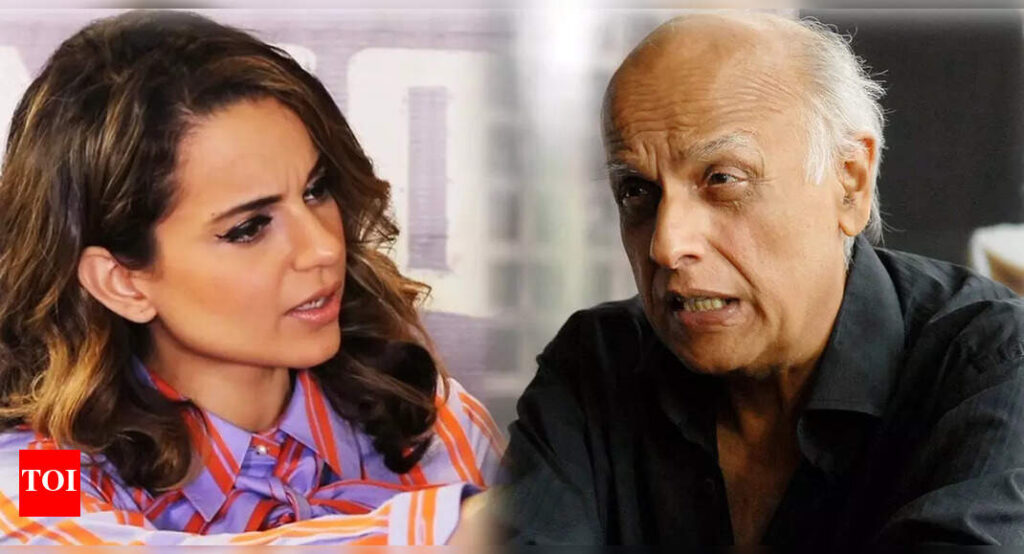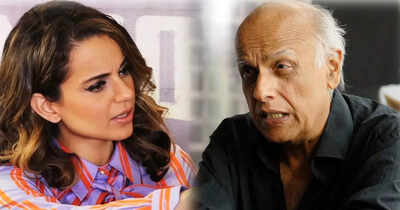Nineteen years ago, gangster: a love story roared onto indian cinema screens, redefining love, betrayal, and heartbreak with a visceral force. directed by anurag basu and produced under the sharp, instinctive eye of mahesh bhatt, the film not only delivered memorable performances by kangana ranaut, emraan hashmi, and shiney ahuja, but also etched itself into the hearts of millions through its soulful music and haunting storytelling.
Today, Mahesh Bhatt revisits the extraordinary journey of Gangster, a film he regards not just as a project but as a living, breathing masterpiece — one that was touched by fate and blessed by what he calls the “Film God.” In this candid conversation, Bhatt reveals the inspirations, the pivotal choices, and the divine accidents that birthed Gangster.
Why do you regard Gangster as your masterpiece?
Some films are made, and some are born from a spark the gods themselves strike. In the secretive corners of the entertainment world — from Hollywood’s golden avenues to Bollywood’s chaotic studios — there is a whispered belief in a force unseen: the Film God. A capricious deity who, with a flick of divine whim, either breathes life into a film or lets it wither.
In Bollywood, we often say, “Filmen achchhi ban jaati hai, banayi nahi jaati.” A film isn’t made — it happens. Gangster was one such miracle.
Gangster: A Love Story simply “happened”?
Exactly. Gangster happened. The film god smiled on it from the very first breath. Every frame seemed touched by destiny. Every note of music trembled with something predestined. It moved through us like a fever dream — alive, unstoppable. And when it hit the screens, it set the box office on fire, creating stars whose light still shines today.
You wrote Gangster. How did the idea come to you?
The idea didn’t come gently — it rushed to my head like blood — violent, undeniable. It was a Sunday morning when it struck. I immediately called Anurag Basu and the entire team, unable to contain the firestorm burning inside me.A good story is like fire: touch it, and it scorches you. Gangster was that fire. It burned everyone who heard it, and they carried its passion into the film.
Why did you choose Anurag Basu to direct it?
Anurag Basu has an alchemical vision — a rare ability to take a raw spark and give it flesh, blood, and soul.
What would you call Anurag Basu’s biggest miracle in Gangster?
His greatest miracle was discovering Kangana Ranaut — a wild, untamed force of nature. In her very first role, she rose like a phoenix, giving Gangster the wings it needed to soar.And then there was South Korea — such an unexpected, beautiful choice. Cherry blossoms falling like soft rain over broken hearts; a foreign land that felt both alien and achingly familiar. It became a silent, emotional backdrop for Pritam’s music.
Speaking of music, what role did it play in Gangster?
Ah, the music! Pritam’s soundtrack didn’t just accompany the film — it possessed it.The album became the fifth best-selling in India for 2006. Millions carried its songs in their hearts.”Ya Ali,” with Zubeen Garg’s haunting voice, crossed oceans and carried the ache of lost love to distant shores.”Tu Hi Meri Shab Hai,” “Bheegi Bheegi” — each song was like a spell woven tighter around the audience, making the film unforgettable.
Tell us about the performances of Kangana Ranaut, Emraan Hashmi, and Shiney Ahuja.
The performances were extraordinary. Emraan Hashmi transformed from a boy into a man before our eyes, sharpening his craft to staggering brilliance.Shiney Ahuja haunted the screen, speaking volumes even in his silences.And Gulshan Grover, long known for villainy, stunned everyone by revealing a bruised, fragile humanity beneath his tough exterior.
Your closing thoughts on Gangster?
Gangster was not just a film. It was love, betrayal, violence, longing — a great, wounded heart beating on screen.It didn’t end — it ripped its ending from the audience’s soul, leaving them shattered and spellbound. Above all, it was Anurag Basu’s triumph: his vision, his risk, his reckless surrender to the fire that Gangster was.Once in a lifetime, if you’re lucky, you can look back and say, Yes. That was a masterpiece. And we were part of it.


